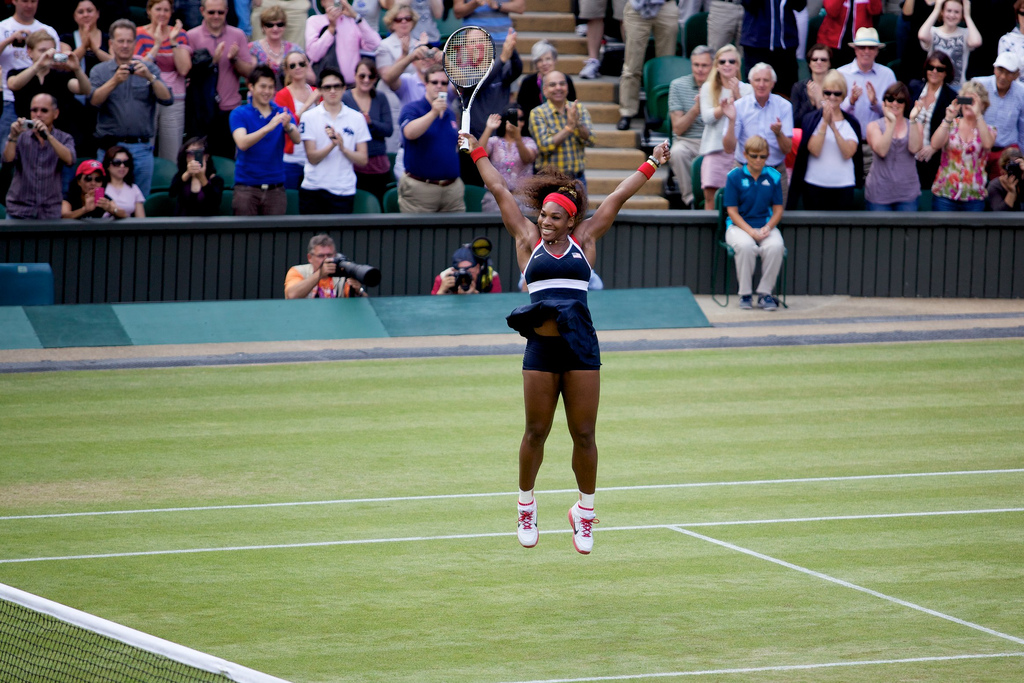Serena Williams is arguably one of the most decorated female athletes of our generation and has won a total of 23 Grand Slam singles titles. While Williams is first and foremost a tennis icon, she has also emerged as a champion for women’s rights and equality both on and off the court.
For those who are unfamiliar with the world of tennis, Serena Williams is no stranger to controversy. Indeed, she is guilty of both “racket” and “verbal” abuse during matches and even accused umpire Carlos Ramos of being a “thief” at the US Open final in 2018. Although I have not always agreed with her on-court demeanour, it is consistently empowering to witness her fight against sexism within the sport itself.
There is no denying that the male players are treated differently than women. Consider the episode with Ramos: Williams received a game penalty after verbally abusing the umpire and thus proceeded to call him a “liar” and a “thief.” In this exchange, some might argue that Williams had been disrespectful and deserved some kind of discipline, yet the female star rightly pointed out the double standard: the same would not have happened to a male tennis player. Billie Jean King, former World No. 1, quickly came to her defence: “When a woman is emotional, she’s ‘hysterical’ and she’s penalized for it”, she reflected on Twitter. “When a man does the same, he’s ‘outspoken’ and there are no repercussions.”
The extent of this double standard in the sport goes well beyond umpires and name-calling. Men can periodically get away with trivial actions like changing shirts on the court, while female players are scrutinized for doing the same. After changing her shirt on the court at the 2018 US Open, French player Alize Cornet received a code violation. But, of course, it never seemed to be an issue when either Rafael Nadal or Novak Djokovic flaunted their abs on court.
Moreover, the tennis fashion police have not always been on Williams’ side. Since the sport is so steeped in tradition, both men and women are subject to a strict dress code on the court. It is customary, for example, for players to wear all-white outfits at Wimbledon, one of the four Grand Slam events that takes place in London, England. After Williams wore a black catsuit–one said to be inspired by the movie Black Panther–at the French Open, a new dress code was implemented by the French Tennis Federation prohibiting players from wearing tight clothing. The president of the federation, President Bernard Giudicelli, justified the change by saying that players “must [have] respect [for] the game and the place.” More recently, Williams was called out for her decision to wear a custom-made bright green playsuit (coined the “Serena-tard”) with fishnets at the 2019 Australian Open. In both cases, Serena explained that the clothing aided her blood circulation after a difficult childbirth. Yet her on-court attire sparked controversy among tennis professionals and spectators alike; while some deemed her an inspiration, others found her outfits disruptive and inappropriate given the nature of the sport.
She is showing that notions of femininity and power are not mutually exclusive, and that honouring tradition within sports should neither be a vehicle for sexism, nor come at the expense of female athletes.
In my view, what remains important here is not the appropriateness of the clothes, but the feminist message Williams is trying to convey by wearing them. She is showing women everywhere — young and old, thin and curvy– that they can wear what they want. She is showing that notions of femininity and power are not mutually exclusive, and that honouring tradition within sports should neither be a vehicle for sexism, nor come at the expense of female athletes.
Perhaps her wearing of a tutu at the 2018 US Open is the perfect illustration of my point. One might associate tutus and feminine attire with “artistic” sports (e.g., ballet and gymnastics) where women are front and centre. Her decision to wear a tutu at a Grand Slam match is emblematic of two worlds colliding; it showed that what is traditionally seen as delicate and beautiful costuming can be worn as a symbol of strength on the court, and that a tutu can do just as good of a job as a pair of shorts.
Williams is not only seeking change on the court, but off the court as well. She has been named the new global ambassador for the woman-centric dating app Bumble, as revealed in the 2019 Super Bowl commercial. The ad is the first of its kind, shaking up a space of commercials typically directed toward men by presenting a commercial that was created by women, for women. What distinguishes Bumble from its competitors is its “women make the first move” formula, empowering women to take control of their romantic lives and reminding them that the ball is always in their court (haha!).
What is traditionally seen as delicate and beautiful costuming can be worn as a symbol of strength on the court, and that a tutu can do just as good of a job as a pair of shorts.
Like the dating app she represents, Williams herself is fighting for a seat at a male-dominated table. In the ad, she reveals that her success was made possible “through her own experience of making first moves,” in both her personal and professional life. Although she has faced many harsh opponents over the years, including racism and sexism, she chose to continue on her trailblazing path, remaining unfazed by her harshest critics.
She said it best herself: “When I am in the lead, I am a closer.”








